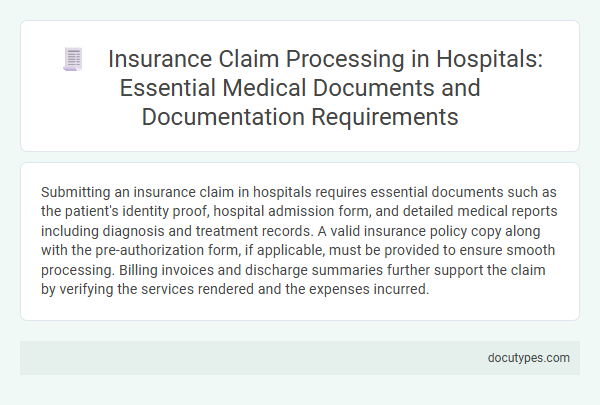Submitting an insurance claim in hospitals requires essential documents such as the patient's identity proof, hospital admission form, and detailed medical reports including diagnosis and treatment records. A valid insurance policy copy along with the pre-authorization form, if applicable, must be provided to ensure smooth processing. Billing invoices and discharge summaries further support the claim by verifying the services rendered and the expenses incurred.
Introduction to Insurance Claim Processing in Hospitals
Insurance claim processing in hospitals involves submitting specific documents to ensure coverage and reimbursement. Essential documents typically include the hospital bill, discharge summary, and medical reports detailing the treatment provided. Your timely submission of these papers facilitates a smooth and efficient claim process.
Importance of Accurate Medical Documentation
Accurate medical documentation is crucial for smooth insurance claim processing in hospitals. It ensures that all treatments, diagnoses, and procedures are correctly recorded, minimizing claim denials or delays. You must provide complete and precise medical records, discharge summaries, and billing information to facilitate timely claim approval.
Key Medical Documents Required for Claims
What documents are required for insurance claim processing in hospitals? Insurance claims demand specific medical documents to validate the treatment and expenses. Key documents include discharge summaries, medical bills, and diagnostic reports.
Patient Admission and Registration Records
| Document Type | Description | Importance in Insurance Claim |
|---|---|---|
| Patient Admission Form | This document records the patient's personal details, admission date, and reason for hospitalization. It establishes the initial point of contact with the hospital. | Essential for verifying the patient's identity and admission timeline, supporting the insurance claim's legitimacy. |
| Registration Records | Includes detailed information such as insurance policy number, contact details, and emergency contacts. It may also capture prior medical history relevant to the treatment. | Critical for confirming insurance coverage and ensuring accurate claim processing by the insurer. |
| Consent Forms | Patient's consent for treatment and information sharing between hospital and insurance provider recorded during registration. | Necessary to authorize the release of medical records and enable claim approval. |
| Identification Proof | Government-issued ID or hospital ID card linked to the admission record. | Validates the patient's identity, preventing fraudulent claims and ensuring claim accuracy. |
Medical History and Examination Reports
Medical history and examination reports are essential documents for insurance claim processing in hospitals. These records provide a detailed account of the patient's previous and current health conditions, which insurers use to verify the legitimacy of the claim.
The medical history includes past illnesses, surgeries, allergies, and ongoing treatments, giving a comprehensive overview of the patient's health background. Examination reports contain diagnostic test results, clinical findings, and physician assessments that support the need for hospital admission and treatment. Accurate and complete documentation of these reports ensures faster claim approval and reduces the risk of claim rejection.
Treatment Plans and Prescription Details
Accurate documentation is essential for smooth insurance claim processing in hospitals. Treatment plans and prescription details serve as critical evidence for medical necessity and prescribed care.
- Treatment Plan - This document outlines the detailed course of medical procedures and interventions planned by the physician, supporting the claim's legitimacy.
- Prescription Details - Prescriptions specify the medications and dosages prescribed during treatment, validating the prescribed therapies for insurance purposes.
- Physician's Signature and Date - Authorized signatures on treatment plans and prescriptions confirm authenticity and the timing of medical care.
Discharge Summary and Final Bill
Insurance claim processing in hospitals necessitates specific documents to validate the patient's treatment and expenses. Two primary documents crucial for this process are the Discharge Summary and the Final Bill.
- Discharge Summary - This document provides a detailed report on the patient's diagnosis, treatment received, and the condition at discharge, serving as proof of hospitalization and medical necessity.
- Final Bill - It itemizes the total medical expenses incurred, including room charges, medications, procedures, and other services, essential for reimbursement calculations.
- Document Verification - Accurate submission of the Discharge Summary and Final Bill ensures a smooth claims process by meeting insurer requirements for authorization and settlement.
Submitting the Discharge Summary and Final Bill promptly facilitates timely insurance claim approval and payment.
Pre-authorization and Referral Letters
Pre-authorization is a critical document for insurance claim processing in hospitals, ensuring coverage approval before medical services are rendered. Hospitals must submit this form to the insurer, detailing the planned procedures and estimated costs.
Referral letters from a primary care physician or specialist facilitate claim approval by confirming the necessity of hospital treatment. These letters also streamline communication between healthcare providers and insurance companies, supporting the legitimacy of the claim.
Common Documentation Errors to Avoid
Hospitals require specific documents such as the insurance claim form, hospital bills, doctor's prescriptions, discharge summary, and diagnostic reports for insurance claim processing. Properly organized documents ensure faster verification and approval by the insurance company.
Common documentation errors to avoid include incomplete claim forms, mismatched patient details, missing signatures, and unclear medical reports. Reviewing your documents thoroughly before submission can help prevent claim delays or rejections.
What Documents Are Required for Insurance Claim Processing in Hospitals? Infographic

